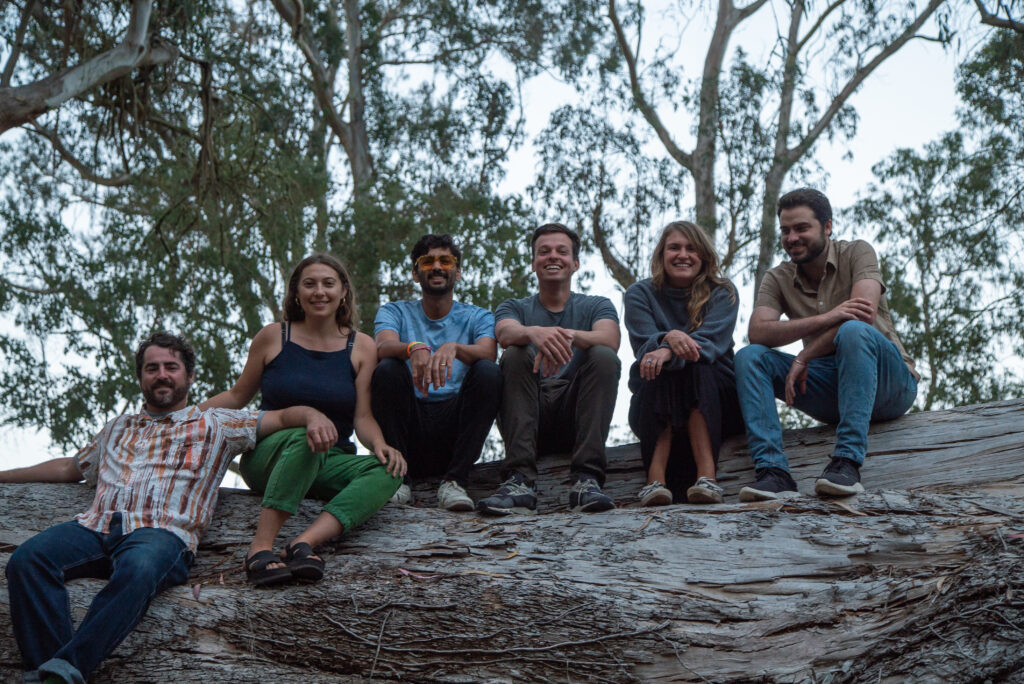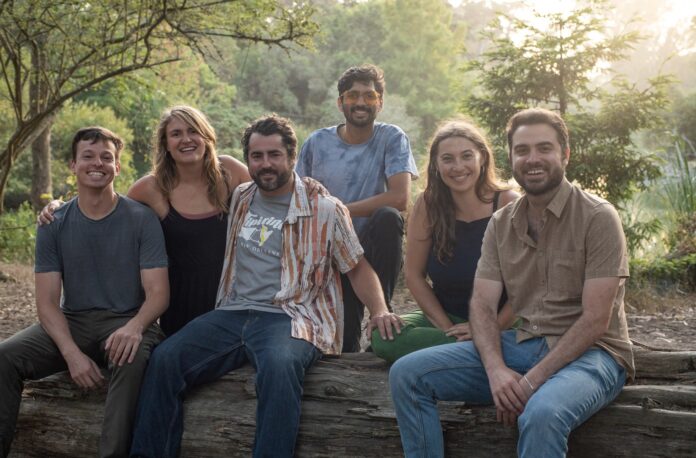Ecological philosopher Timothy Morton describes climate change as a “hyperobject,” meaning a phenomena “so vast in both temporal or spatial terms that we can only see slices of it at a time.” Much like looking into the sun, it is impossible to ever fully see the enormity of climate change, how every decision we make today will affect untold lives in the future. In fact, Morton argues, to spend too much time trying to do so will only evoke madness and depression, which is counterproductive to the urgent work at hand.
We are fated to receive climate change one tiny slice of horror at a time. And only when that slice is jarring enough do we dare, just for a moment, to peer up at the searing enormity of all that’s coming for us. Of course, we can’t stand to look for long. But for a brief moment, we see it. And it burns. And try as we might to live as we did before we glimpsed it, we can’t ever go back. So, how then do we stay sane enough to do the work that is required?
Sally Mango, a San Francisco-based indie-jazz-pop band, sees their music as an attempt to dance with the coming apocalypse. If we can’t sustain a straight-on look at climate change, then what if we tried dancing at its fringes? We can weave in and out of its terrors, all the while never losing sight of what makes fighting for survival worthwhile: love, family, friends—and of course, good music.
Fittingly, the group’s most recent release, the stellar Pressure Slide, arrived just as the rivers opened up above California, drenching the state in its most extreme downpour since 1871.
As the rain battered my windows, the wind thrashed the city’s Monterey pines and blue gum eucalyptus, and mud cascaded down more than 300 Californian hills. It was impossible not to look up and glimpse the menacing hyperobject above. Even harder was avoiding the debilitating dread that staring climate change straight on can provoke. But instead of dissolving into fear and guilt, I turned to Sally Mango.
Pressure Slide is the band’s second album, and it introduces the theme of ecological collapse from the very start. Before, there is music, there is birdsong. The album begins with chirps, and a soothing sense that before and after humans, there will always be music. Then, a soft voice floats in. “And the birds flew away,” it sings, both introduction and omen. One can’t help but be reminded of the week when the Bay turned red with toxic algae and the waterfowl evacuated for weeks.
Soon, a synth swells, the refrain repeats, and little guitar, electric piano, and horn riffs add their chirps to the ecology of the song.
“The Buenavista” picks up the torch lit in the introduction. Over a rolling bassline that each member of the six-part band slowly joins, lead singer Zia Grossman-Vendrillo laments the changing climate: “Searching the future / broken and ragged / acid fallen from the sky / I’ve got a feeling we’ll work harder / When nothing’s left we’ll see the stars.” The tension builds until it reaches the chorus, where there’s a euphoric release reminiscent of a joyous Lake Street Dive track. Here, Grossman-Vendrillo strikes a more hopeful chord, “All these days go by / I realize we have tonight.” In other words, she asks: how do we retrain our attention from future catastrophe to the present moment?
Help us save local journalism!
Every tax-deductible donation helps us grow to cover the issues that mean the most to our community. Become a 48 Hills Hero and support the only daily progressive news source in the Bay Area.

The remainder of the album offers the answer: by looking toward the intimacy of friends, family, lovers.
Through sparkling neo-soul keys accompanied by the harmonizing saxophone and trumpet that help define the group’s crisp, grooving sound, album stand-out “Distance” celebrates moving on from a relationship that isn’t working for the narrator. Its companion “Soulcaster” urges a friend to leave a toxic relationship: “I know it’s scary the life you’ll have to bury / but your story will unfold.” On “Flowers on the Vine,” the album’s most beautifully crafted lyrics find Grossman-Vendrillo dreaming backward in time, along the proverbial flowers on the vine, to witness the ways in which her female ancestors shared their skills, wisdom, and beauty with the generations to follow. And on the eponymous “Pressure Slide”, a palm-muted guitar and swinging horns lay down the red carpet for Grossman-Vendrillo to confront haunting relationship anxiety. She accomplishes this by citing a somatic exercise in which you slide your fists down your chest to help release anxiety and enhance presence.
As I listened to Pressure Slide over and over again, it took me a while to understand why this album would serve as the blanket in which I wrapped myself during the frightening deluge of 2023. Ostensibly, the band writes music that wrestles with climate change. But in practice, most of the songs focus more on the interpersonal. So what was it that made the album such a soothing balm amidst the deluge?
The answer evaded me—until I revisited a passage from Sally Rooney’s novel Beautiful World, Where Are You? The narrator is terribly concerned about climate change and laments that humans don’t seem to have what it takes to adequately confront the phenomenon. But then, she changes her tune. She writes, “Maybe we’re just born to love and worry about the people we know, and to go on loving and worrying even when there are more important things we should be doing … Because when we should have been reorganising [sic] the distribution of the world’s resources and transitioning collectively to a sustainable economic model, we were worrying about sex and friendship instead … And I love that about humanity, and in fact it’s the very reason I root for us to survive.”
Perhaps Morton and Rooney, and by extension Sally Mango, are right. We must attune ourselves to the demands of impending disaster. But at the same time, we must resist losing ourselves to madness and depression. What is left? Pressure Slide answers that we must be aware, we must work harder—but that all the while, we must never forget to love, celebrate, mourn, and most of all, dance.







